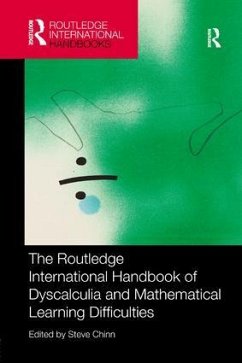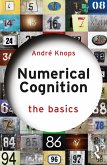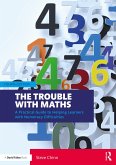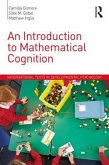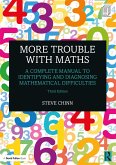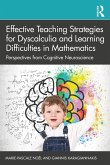The Routledge International Handbook of Dyscalculia and Mathematical Learning Difficulties
Herausgeber: Chinn, Steve
The Routledge International Handbook of Dyscalculia and Mathematical Learning Difficulties
Herausgeber: Chinn, Steve
- Broschiertes Buch
- Merkliste
- Auf die Merkliste
- Bewerten Bewerten
- Teilen
- Produkt teilen
- Produkterinnerung
- Produkterinnerung
The Routledge International Handbook of Dyscalculia and Mathematical Learning Difficulties is the authoritative volume and is essential reading for academics in the field of mathematics. It is an incredibly important contribution to the study of dyscalculia and mathematical difficulties in children and young adults.
Andere Kunden interessierten sich auch für
![Numerical Cognition Numerical Cognition]() Andre KnopsNumerical Cognition20,99 €
Andre KnopsNumerical Cognition20,99 €![The Trouble with Maths The Trouble with Maths]() Steve ChinnThe Trouble with Maths32,99 €
Steve ChinnThe Trouble with Maths32,99 €![An Introduction to Mathematical Cognition An Introduction to Mathematical Cognition]() Camilla Gilmore (UK Loughborough University)An Introduction to Mathematical Cognition54,99 €
Camilla Gilmore (UK Loughborough University)An Introduction to Mathematical Cognition54,99 €![More Trouble with Maths More Trouble with Maths]() Steve ChinnMore Trouble with Maths75,99 €
Steve ChinnMore Trouble with Maths75,99 €![Effective Teaching Strategies for Dyscalculia and Learning Difficulties in Mathematics Effective Teaching Strategies for Dyscalculia and Learning Difficulties in Mathematics]() Marie-Pascale NoelEffective Teaching Strategies for Dyscalculia and Learning Difficulties in Mathematics51,99 €
Marie-Pascale NoelEffective Teaching Strategies for Dyscalculia and Learning Difficulties in Mathematics51,99 €![The Routledge International Handbook of Work-Integrated Learning The Routledge International Handbook of Work-Integrated Learning]() The Routledge International Handbook of Work-Integrated Learning303,99 €
The Routledge International Handbook of Work-Integrated Learning303,99 €![The Routledge International Handbook of Research on Dialogic Education The Routledge International Handbook of Research on Dialogic Education]() The Routledge International Handbook of Research on Dialogic Education280,99 €
The Routledge International Handbook of Research on Dialogic Education280,99 €-
-
-
The Routledge International Handbook of Dyscalculia and Mathematical Learning Difficulties is the authoritative volume and is essential reading for academics in the field of mathematics. It is an incredibly important contribution to the study of dyscalculia and mathematical difficulties in children and young adults.
Produktdetails
- Produktdetails
- Routledge International Handbooks of Education
- Verlag: Taylor & Francis Ltd
- Seitenzahl: 462
- Erscheinungstermin: 12. Oktober 2017
- Englisch
- Abmessung: 234mm x 156mm x 25mm
- Gewicht: 706g
- ISBN-13: 9781138577312
- ISBN-10: 1138577316
- Artikelnr.: 49785032
- Herstellerkennzeichnung
- Libri GmbH
- Europaallee 1
- 36244 Bad Hersfeld
- gpsr@libri.de
- Routledge International Handbooks of Education
- Verlag: Taylor & Francis Ltd
- Seitenzahl: 462
- Erscheinungstermin: 12. Oktober 2017
- Englisch
- Abmessung: 234mm x 156mm x 25mm
- Gewicht: 706g
- ISBN-13: 9781138577312
- ISBN-10: 1138577316
- Artikelnr.: 49785032
- Herstellerkennzeichnung
- Libri GmbH
- Europaallee 1
- 36244 Bad Hersfeld
- gpsr@libri.de
Steve Chinn is an independent consultant, researcher and writer who presents papers and contributes to conferences world-wide. He has delivered training courses for teachers, psychologists, parents and support assistants in over thirty countries. Among his other books are the award-winning The Trouble with Maths (now in its second edition, 2011) and More Trouble with Maths (2012), both published by Routledge.
The International Handbook on Dyscalculia and Mathematics Learning
Difficulties: An overview Steve Chinn 1.How can cognitive developmental
neuroscience constrain our understanding of developmental dyscalculia?
Stephanie Bugden and Daniel Ansari 2.Number Difficulties in Young Children:
Deficits in Core Number? Robert A. Reeve; Sarah Gray 3. Sets and digits:
How are they processed by children with typical and atypical numerical
cognition? Evidence from brain and behaviour Vivian Reigosa-Crespo; Danilka
Castro 4. When and why numerosity processing is associated with
developmental dyscalculia Xinlin Zhou; Dazhi Cheng 5. Predictive indicators
for mathematical learning disabilities/dyscalculia in kindergarten children
Annemie Desoete 6. The link between mathematics and logical reasoning:
Implications for research and education Denes Szucs; Kinga Morsanyi 7.How
specific is the specific disorder of arithmetic skills? Karin Landerl 8.
Arithmetic Difficulties of Children with Hearing Impairment Gowramma, I.P.
9. Arithmetic Difficulties among Socially Disadvantaged Children and
Children with Dyscalculia Ramaa S 10. Meeting the needs of the 'bottom
eighty per cent' - Towards an inclusive mathematics curriculum in Uganda
Tandi Clausen-May 11. Dyscalculia in Arabic speaking children: Assessment
and intervention practices John Everatt; Abdessatar Mahfoudhi; Mowafak
Al-Manabri; Gad Elbeheri 12. Mathematics Learning and Its Difficulties
among Chinese Children in Hong Kong Connie Suk-Han Ho; Terry Tin-Yau Wong;
Winnie Wai Lan Chan 13. The Acquisition of Mathematics Skills of Filipino
Children with Learning Difficulties: Issues and Challenges Sherlynmay
Hamak; Jai Astilla Hazelle; P. Preclaro 14. The Enigma of Dyscalculia Jane
Emerson 15. Deep Diagnosis, Focused Instruction, and Expanded Math Horizons
R B Ashlock 16. Preschool Children's Quantitative Knowledge and Long-Term
Risk for Functional Innumeracy David C. Geary 17. Learning Disabilities:
Mathematics Characteristics and Instructional Exemplars Diane Pedrotty
Bryant; Brian R. Bryant; Mikyung Shin; Kathleen Hughes Pfannenstiel; 18.
Targeted interventions for children with difficulties in learning
mathematics Ann Dowker; Peter Morris 19. Focused MLD intervention based on
the classification of MLD subtypes Giannis N. Karagiannakis; G. N.;
Cooreman, A. 20. Numbersense: A Window into Dyscalculia and other
Mathematics Difficulties Mahesh C. Sharma 21. The Center for Improving
Learning of Fractions: A Progress Report Robert Siegler; Lynn Fuchs; Nancy
Jordan; Russell Gersten; Rob Ochsendorf 22. Lights and Shadows of Mental
Arithmetic: Analysis of cognitive processes in typical and atypical
development Sara Caviola; Daniela Lucangeli 23. Teacher Training : Solving
the problem Judy Hornigold 24. Mathematics Anxiety, Working Memory, and
Mathematical Performance: The Triple Task Effect and the Affective Drop in
Performance Alex M. Moore; Amy J. McAuley; Gabriel A. Allred; Mark H.
Ashcraft 25. Mathematical resilience: What is it and why is it important?
Clare Lee; Sue Johnston-Wilder 26. Linguistic factors in the development of
basic calculation Chris Donlan 27. Promoting Word Problem Solving
Performance Amongst Students With Mathematics Difficulties: The Role of
Strategy instruction that Primes the Problem Structure Asha K. Jitendra;
Danielle N. Dupuis; Amy E. Lein 28. Mathematical Storyteller Kings and
Queens: an alternative pedagogical choice to facilitate mathematical
thinking and understand children's mathematical capabilities Caroline
McGrath 29. The Effects of Computer Technology on Primary School Students'
Mathematics Achievement: a Meta-analysis Egbert Harskamp 30. Representing,
Acting, and Engaging: UDL and Mathematics Elizabeth Murray; Garron
Hillaire; Mindy Johnson; Gabrielle Rappolt-Schlichtmann 31. Dyscalculia in
Higher Education: systems, support and student strategies Clare Trott
Difficulties: An overview Steve Chinn 1.How can cognitive developmental
neuroscience constrain our understanding of developmental dyscalculia?
Stephanie Bugden and Daniel Ansari 2.Number Difficulties in Young Children:
Deficits in Core Number? Robert A. Reeve; Sarah Gray 3. Sets and digits:
How are they processed by children with typical and atypical numerical
cognition? Evidence from brain and behaviour Vivian Reigosa-Crespo; Danilka
Castro 4. When and why numerosity processing is associated with
developmental dyscalculia Xinlin Zhou; Dazhi Cheng 5. Predictive indicators
for mathematical learning disabilities/dyscalculia in kindergarten children
Annemie Desoete 6. The link between mathematics and logical reasoning:
Implications for research and education Denes Szucs; Kinga Morsanyi 7.How
specific is the specific disorder of arithmetic skills? Karin Landerl 8.
Arithmetic Difficulties of Children with Hearing Impairment Gowramma, I.P.
9. Arithmetic Difficulties among Socially Disadvantaged Children and
Children with Dyscalculia Ramaa S 10. Meeting the needs of the 'bottom
eighty per cent' - Towards an inclusive mathematics curriculum in Uganda
Tandi Clausen-May 11. Dyscalculia in Arabic speaking children: Assessment
and intervention practices John Everatt; Abdessatar Mahfoudhi; Mowafak
Al-Manabri; Gad Elbeheri 12. Mathematics Learning and Its Difficulties
among Chinese Children in Hong Kong Connie Suk-Han Ho; Terry Tin-Yau Wong;
Winnie Wai Lan Chan 13. The Acquisition of Mathematics Skills of Filipino
Children with Learning Difficulties: Issues and Challenges Sherlynmay
Hamak; Jai Astilla Hazelle; P. Preclaro 14. The Enigma of Dyscalculia Jane
Emerson 15. Deep Diagnosis, Focused Instruction, and Expanded Math Horizons
R B Ashlock 16. Preschool Children's Quantitative Knowledge and Long-Term
Risk for Functional Innumeracy David C. Geary 17. Learning Disabilities:
Mathematics Characteristics and Instructional Exemplars Diane Pedrotty
Bryant; Brian R. Bryant; Mikyung Shin; Kathleen Hughes Pfannenstiel; 18.
Targeted interventions for children with difficulties in learning
mathematics Ann Dowker; Peter Morris 19. Focused MLD intervention based on
the classification of MLD subtypes Giannis N. Karagiannakis; G. N.;
Cooreman, A. 20. Numbersense: A Window into Dyscalculia and other
Mathematics Difficulties Mahesh C. Sharma 21. The Center for Improving
Learning of Fractions: A Progress Report Robert Siegler; Lynn Fuchs; Nancy
Jordan; Russell Gersten; Rob Ochsendorf 22. Lights and Shadows of Mental
Arithmetic: Analysis of cognitive processes in typical and atypical
development Sara Caviola; Daniela Lucangeli 23. Teacher Training : Solving
the problem Judy Hornigold 24. Mathematics Anxiety, Working Memory, and
Mathematical Performance: The Triple Task Effect and the Affective Drop in
Performance Alex M. Moore; Amy J. McAuley; Gabriel A. Allred; Mark H.
Ashcraft 25. Mathematical resilience: What is it and why is it important?
Clare Lee; Sue Johnston-Wilder 26. Linguistic factors in the development of
basic calculation Chris Donlan 27. Promoting Word Problem Solving
Performance Amongst Students With Mathematics Difficulties: The Role of
Strategy instruction that Primes the Problem Structure Asha K. Jitendra;
Danielle N. Dupuis; Amy E. Lein 28. Mathematical Storyteller Kings and
Queens: an alternative pedagogical choice to facilitate mathematical
thinking and understand children's mathematical capabilities Caroline
McGrath 29. The Effects of Computer Technology on Primary School Students'
Mathematics Achievement: a Meta-analysis Egbert Harskamp 30. Representing,
Acting, and Engaging: UDL and Mathematics Elizabeth Murray; Garron
Hillaire; Mindy Johnson; Gabrielle Rappolt-Schlichtmann 31. Dyscalculia in
Higher Education: systems, support and student strategies Clare Trott
The International Handbook on Dyscalculia and Mathematics Learning
Difficulties: An overview Steve Chinn 1.How can cognitive developmental
neuroscience constrain our understanding of developmental dyscalculia?
Stephanie Bugden and Daniel Ansari 2.Number Difficulties in Young Children:
Deficits in Core Number? Robert A. Reeve; Sarah Gray 3. Sets and digits:
How are they processed by children with typical and atypical numerical
cognition? Evidence from brain and behaviour Vivian Reigosa-Crespo; Danilka
Castro 4. When and why numerosity processing is associated with
developmental dyscalculia Xinlin Zhou; Dazhi Cheng 5. Predictive indicators
for mathematical learning disabilities/dyscalculia in kindergarten children
Annemie Desoete 6. The link between mathematics and logical reasoning:
Implications for research and education Denes Szucs; Kinga Morsanyi 7.How
specific is the specific disorder of arithmetic skills? Karin Landerl 8.
Arithmetic Difficulties of Children with Hearing Impairment Gowramma, I.P.
9. Arithmetic Difficulties among Socially Disadvantaged Children and
Children with Dyscalculia Ramaa S 10. Meeting the needs of the 'bottom
eighty per cent' - Towards an inclusive mathematics curriculum in Uganda
Tandi Clausen-May 11. Dyscalculia in Arabic speaking children: Assessment
and intervention practices John Everatt; Abdessatar Mahfoudhi; Mowafak
Al-Manabri; Gad Elbeheri 12. Mathematics Learning and Its Difficulties
among Chinese Children in Hong Kong Connie Suk-Han Ho; Terry Tin-Yau Wong;
Winnie Wai Lan Chan 13. The Acquisition of Mathematics Skills of Filipino
Children with Learning Difficulties: Issues and Challenges Sherlynmay
Hamak; Jai Astilla Hazelle; P. Preclaro 14. The Enigma of Dyscalculia Jane
Emerson 15. Deep Diagnosis, Focused Instruction, and Expanded Math Horizons
R B Ashlock 16. Preschool Children's Quantitative Knowledge and Long-Term
Risk for Functional Innumeracy David C. Geary 17. Learning Disabilities:
Mathematics Characteristics and Instructional Exemplars Diane Pedrotty
Bryant; Brian R. Bryant; Mikyung Shin; Kathleen Hughes Pfannenstiel; 18.
Targeted interventions for children with difficulties in learning
mathematics Ann Dowker; Peter Morris 19. Focused MLD intervention based on
the classification of MLD subtypes Giannis N. Karagiannakis; G. N.;
Cooreman, A. 20. Numbersense: A Window into Dyscalculia and other
Mathematics Difficulties Mahesh C. Sharma 21. The Center for Improving
Learning of Fractions: A Progress Report Robert Siegler; Lynn Fuchs; Nancy
Jordan; Russell Gersten; Rob Ochsendorf 22. Lights and Shadows of Mental
Arithmetic: Analysis of cognitive processes in typical and atypical
development Sara Caviola; Daniela Lucangeli 23. Teacher Training : Solving
the problem Judy Hornigold 24. Mathematics Anxiety, Working Memory, and
Mathematical Performance: The Triple Task Effect and the Affective Drop in
Performance Alex M. Moore; Amy J. McAuley; Gabriel A. Allred; Mark H.
Ashcraft 25. Mathematical resilience: What is it and why is it important?
Clare Lee; Sue Johnston-Wilder 26. Linguistic factors in the development of
basic calculation Chris Donlan 27. Promoting Word Problem Solving
Performance Amongst Students With Mathematics Difficulties: The Role of
Strategy instruction that Primes the Problem Structure Asha K. Jitendra;
Danielle N. Dupuis; Amy E. Lein 28. Mathematical Storyteller Kings and
Queens: an alternative pedagogical choice to facilitate mathematical
thinking and understand children's mathematical capabilities Caroline
McGrath 29. The Effects of Computer Technology on Primary School Students'
Mathematics Achievement: a Meta-analysis Egbert Harskamp 30. Representing,
Acting, and Engaging: UDL and Mathematics Elizabeth Murray; Garron
Hillaire; Mindy Johnson; Gabrielle Rappolt-Schlichtmann 31. Dyscalculia in
Higher Education: systems, support and student strategies Clare Trott
Difficulties: An overview Steve Chinn 1.How can cognitive developmental
neuroscience constrain our understanding of developmental dyscalculia?
Stephanie Bugden and Daniel Ansari 2.Number Difficulties in Young Children:
Deficits in Core Number? Robert A. Reeve; Sarah Gray 3. Sets and digits:
How are they processed by children with typical and atypical numerical
cognition? Evidence from brain and behaviour Vivian Reigosa-Crespo; Danilka
Castro 4. When and why numerosity processing is associated with
developmental dyscalculia Xinlin Zhou; Dazhi Cheng 5. Predictive indicators
for mathematical learning disabilities/dyscalculia in kindergarten children
Annemie Desoete 6. The link between mathematics and logical reasoning:
Implications for research and education Denes Szucs; Kinga Morsanyi 7.How
specific is the specific disorder of arithmetic skills? Karin Landerl 8.
Arithmetic Difficulties of Children with Hearing Impairment Gowramma, I.P.
9. Arithmetic Difficulties among Socially Disadvantaged Children and
Children with Dyscalculia Ramaa S 10. Meeting the needs of the 'bottom
eighty per cent' - Towards an inclusive mathematics curriculum in Uganda
Tandi Clausen-May 11. Dyscalculia in Arabic speaking children: Assessment
and intervention practices John Everatt; Abdessatar Mahfoudhi; Mowafak
Al-Manabri; Gad Elbeheri 12. Mathematics Learning and Its Difficulties
among Chinese Children in Hong Kong Connie Suk-Han Ho; Terry Tin-Yau Wong;
Winnie Wai Lan Chan 13. The Acquisition of Mathematics Skills of Filipino
Children with Learning Difficulties: Issues and Challenges Sherlynmay
Hamak; Jai Astilla Hazelle; P. Preclaro 14. The Enigma of Dyscalculia Jane
Emerson 15. Deep Diagnosis, Focused Instruction, and Expanded Math Horizons
R B Ashlock 16. Preschool Children's Quantitative Knowledge and Long-Term
Risk for Functional Innumeracy David C. Geary 17. Learning Disabilities:
Mathematics Characteristics and Instructional Exemplars Diane Pedrotty
Bryant; Brian R. Bryant; Mikyung Shin; Kathleen Hughes Pfannenstiel; 18.
Targeted interventions for children with difficulties in learning
mathematics Ann Dowker; Peter Morris 19. Focused MLD intervention based on
the classification of MLD subtypes Giannis N. Karagiannakis; G. N.;
Cooreman, A. 20. Numbersense: A Window into Dyscalculia and other
Mathematics Difficulties Mahesh C. Sharma 21. The Center for Improving
Learning of Fractions: A Progress Report Robert Siegler; Lynn Fuchs; Nancy
Jordan; Russell Gersten; Rob Ochsendorf 22. Lights and Shadows of Mental
Arithmetic: Analysis of cognitive processes in typical and atypical
development Sara Caviola; Daniela Lucangeli 23. Teacher Training : Solving
the problem Judy Hornigold 24. Mathematics Anxiety, Working Memory, and
Mathematical Performance: The Triple Task Effect and the Affective Drop in
Performance Alex M. Moore; Amy J. McAuley; Gabriel A. Allred; Mark H.
Ashcraft 25. Mathematical resilience: What is it and why is it important?
Clare Lee; Sue Johnston-Wilder 26. Linguistic factors in the development of
basic calculation Chris Donlan 27. Promoting Word Problem Solving
Performance Amongst Students With Mathematics Difficulties: The Role of
Strategy instruction that Primes the Problem Structure Asha K. Jitendra;
Danielle N. Dupuis; Amy E. Lein 28. Mathematical Storyteller Kings and
Queens: an alternative pedagogical choice to facilitate mathematical
thinking and understand children's mathematical capabilities Caroline
McGrath 29. The Effects of Computer Technology on Primary School Students'
Mathematics Achievement: a Meta-analysis Egbert Harskamp 30. Representing,
Acting, and Engaging: UDL and Mathematics Elizabeth Murray; Garron
Hillaire; Mindy Johnson; Gabrielle Rappolt-Schlichtmann 31. Dyscalculia in
Higher Education: systems, support and student strategies Clare Trott

